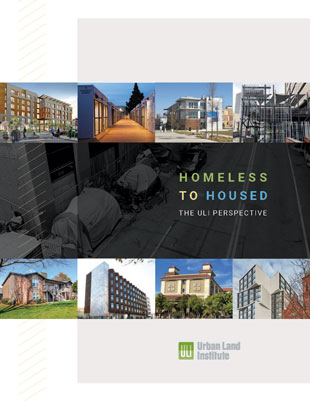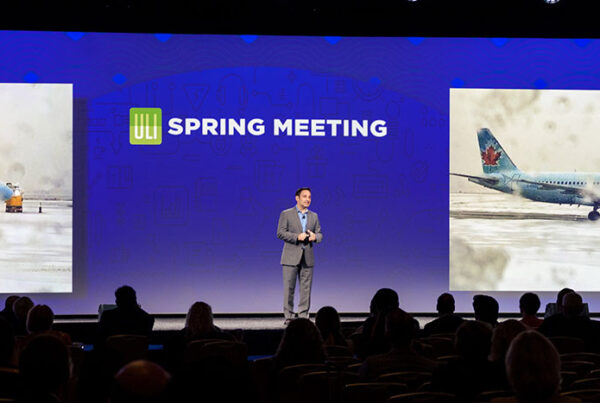
From left to right: Maria Ariizumi, head of development at Swire Hotels; Martin Lee, CEO of Chinese & Western restaurants at Hong Kong’s Maxim’s Group; Jonathan Zeman, CEO of Lan Kwai Fong Group; and Syed Assim Hussain, co-founder of Black Sheep Restaurants discussing the state of the food and beverage space at a ULI Hong Kong conference.
Hong Kong is famous for its hospitality industry, but the sector has been under fire for the past three years‑first political unrest and now the COVID-19 pandemic. Even so, the hotel and food and beverage (F&B) industries have shown surprising resilience and adaptability.
That’s according to two recent panel discussions during the ULI Hong Kong conference at the Murray Hotel in September. Panelists looked at the resilience of the Hong Kong hotels and F&B industries and how both are adapting to challenges.
Maria Ariizumi, head of development at Swire Hotels, moderator of the F&B panel, said the pandemic has led to some curious circumstances in Hong Kong. One boom in the popularity of Japanese restaurants, already a mainstay of the Hong Kong dining scene. Panelist Martin Lee, CEO of Chinese & Western restaurants at Hong Kong’s Maxim’s Group, said Japanese restaurants have been the best performing in his company’s portfolio, noting that a number of new smaller Japanese restaurants have popped up all over town.
Jonathan Zeman, CEO of Lan Kwai Fong Group, agreed, saying: “We run three Japanese restaurants ourselves and they have all roared back to life, which is really great.”
“I think Tokyo’s one of the top tourist destinations for Hong Kong people, and when you can’t travel, you look for that experience at home,” said Zeman, adding that the desire for experience has also bolstered the popularity of smaller, more intimate restaurants.
In addition to new restaurants, Hong Kong has seen a surge in new independent coffee shops, suggesting a need for social spaces in the currently isolated city.
Syed Assim Hussain, co-founder of Black Sheep Restaurants, said remaining resilient in the face of adversity has given his business confidence to expand and even take on larger projects. “I think just by the virtue of surviving, we have some opportunities available to us that are truly world-class. These are opportunities for us to change our destiny as a small restaurant team. We feel maybe this is the time to take a few risks, to view larger sites.”
The pandemic has also changed the relationship between landlords and F&B tenants for the better. “Landlord bashing is a favorite tenant sport in Hong Kong,” Hussain noted. “However, we work with large and small landlords, and I can tell you that the support across the board has been quite positive. Although I should also say that we have done good work for our landlord partners.”
“A lot of developers have been very helpful and helped us to survive because of the relief they gave us,” Lee added, explaining that there’s more of a partnership between landlords and tenants now and that landlords have been particularly supportive of innovative concepts.
Overall, the mood in the city’s F&B businesses is positive, with Hong Kong diners returning to restaurants dining since spring, clearly not content to stay home and order delivery. “Even if Hong Kong remains in a tight lockdown for another year, I feel we will be okay,” Hussain said.
In contrast, the mood of the hotels panel was somewhat gloomier, with the focus on surviving rather than thriving. The panel featured representatives from several leading hotel groups, speaking anonymously. Panelists were highly critical of the restrictions on travel, which have been some of the strongest in the world. Hong Kong’s hotel groups have also been setting the city an example for vaccination, with the vast majority of staff fully vaccinated, panelists said.
While restaurants in hotels have been busy, hotels require rooms and banqueting halls to be occupied if they are to turn a profit. At present, with dining and staycations, Hong Kong hotels are surviving, but only breaking even. However, the consensus is that business will bounce back dramatically once the border is open again.
The positive for the hotel industry is that the pandemic has driven innovation. Technology is at the heart of this; for example, more hotels are using automation to reduce staffing levels, as lean operations are crucial. Technology can also help build a streamlined loyalty scheme and manage customer information, which means more people booking directly through hotels. One hotelier said that more than two-thirds of 2021’s capital expenditure had been on technology.
Thankfully Hong Kong is still a great place to do business and is a gateway to China. Though strict regulations and ongoing uncertainties means the hotel industry still has a few harsh realities to face. Staycations, though popular, are not sustainable. Looking to the future, the possibility remains that large banqueting events may not return in the same way, which means that space might have to be adapted. An understanding of the evolving needs of customers, more demand for outside space and focus on efficiency and sustainability, more use of technology to ensure even more resiliency.



